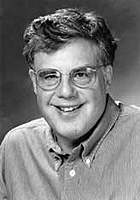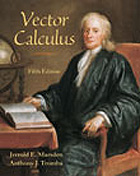|
August 4, 2003
Math prof seeks to reconnect mathematics to its
intellectual roots
By Tim Stephens
Anthony Tromba has loved mathematics since he was a child, and it bothers
him that the field seems to be losing its appeal to students.
|

|
| Mathematics professor Anthony
Tromba's new edition of Vector Calculus, below, seeks to
put mathematics in a historical context. |
 |
Tromba, professor and chair of mathematics at UCSC, said that when
he was an undergraduate in the 1960s there were nearly six times as
many mathematics majors in the United States as there are today. Although
there are probably many reasons for this trend, one factor may be the
way mathematics tends to be taught, he said.
"People don't teach mathematics as an intellectual discipline,
but more as a collection of facts or theorems, without putting it in
the context of why one would be interested in it in the first place,"
Tromba said.
The connection of mathematics to the humanities and to its own roots
as a discipline has been severed, he said. Tromba has tried to counter
this trend in the new edition of his widely used textbook, Vector
Calculus, coauthored with Jerrold Marsden of the California Institute
of Technology. The book has been a standard university textbook for
more than 27 years and has been translated into six languages. Nevertheless,
Tromba said he felt it was time for a change. The revised 5th edition,
published in July by W. H. Freeman, features a striking portrait
of Isaac Newton on the cover and a whole new approach in the text.
"We radically changed it. We tried to put the mathematics in historical
context and illuminate the thought processes that lead to mathematical
results," Tromba said.
Tromba's 1996 book The Parsimonious Universe, coauthored with
Stefan Hildebrandt, took a similar approach, while aiming for a more
general readership. Written in a lively and accessible style, the book
explores mathematical insights into the variety of shapes and forms
found in the natural world.
Tromba enjoys contemplating the insights of the great mathematicians
of the past--intellectual giants like Newton, Leibniz, Huygens, and
Galileo. Perhaps the most breathtaking insight of all, he said, was
the conclusion of the ancient Greeks that the world could be understood
through mathematics.
"This was a very profound insight, because we really don't understand
the universe. The universe is mind-boggling--it is beyond human comprehension--and
yet we can deal with it on a theoretical basis using mathematical models,"
Tromba said.
The power of such models is apparent from the many instances in which
formal mathematical theories have predicted natural phenomena that were
not discovered or confirmed until many years later. Maxwell's equations,
for example, predicted radio waves, and Einstein's field equations predicted
that gravity would bend light and that the universe is expanding.
To students, mathematics can often seem like little more than a set
of arcane rules for manipulating abstract symbols. According to Tromba,
however, there is a mystical aspect of mathematics that is not often
communicated to students.
"When you discover mathematical structures that you believe correspond
to the world around you, you feel you are seeing something mystical,
something profound," he said. "You are communicating with
the universe, seeing beautiful and deep structures and patterns that
no one without your training can see."
Tromba noted that mathematicians do not invent mathematics, they discover
it.
"The mathematics is there, it's leading you, and you are discovering
it," he said.
"Mathematics is a profound language, an awesomely beautiful language.
For some, like Leibniz, it is the language of God. I'm not religious,
but I do believe that the universe is organized mathematically."
Tromba has been honored recently for both his teaching and his contributions
to mathematics. He received an Excellence in Teaching Award for 2001-02
from UCSC's Academic Senate, and in May 2003, Tromba's colleagues held
a symposium in honor of his 60th birthday (which is in August). Dubbed
"Tony Fest," the symposium brought together many of the mathematicians
Tromba has worked with during his career for two days of lectures and
social activities. Though initially reluctant to be the object of such
attention, Tromba said he was very moved by the event.
"One of the great things in my life has been to be able to interact
with brilliant mathematicians, to work with some of them, and to understand
their genius," he said. "I don't consider myself one of them,
but to understand and to be blown away by such awesome genius--it's
like coming close to Mozart or Bach."
Although Tromba speaks eloquently about the intellectual thrills of
mathematics, he acknowledges that such thrills are really only accessible
to mathematicians.
"With art and music, people can feel the greatness of the work
without actually understanding its structure and complexity. You don't
have to be a musician to appreciate Mozart's Requiem, but
mathematics doesn't afford you the same opportunity--it's a very small club,"
he said.
Tromba is doing his best to encourage more students to join that club.
Return to Front Page
|